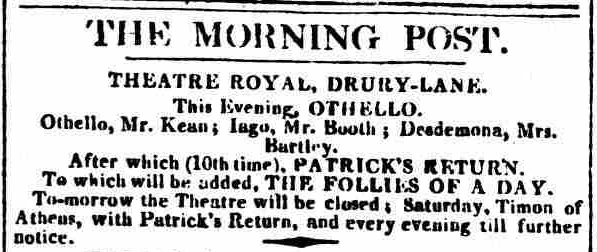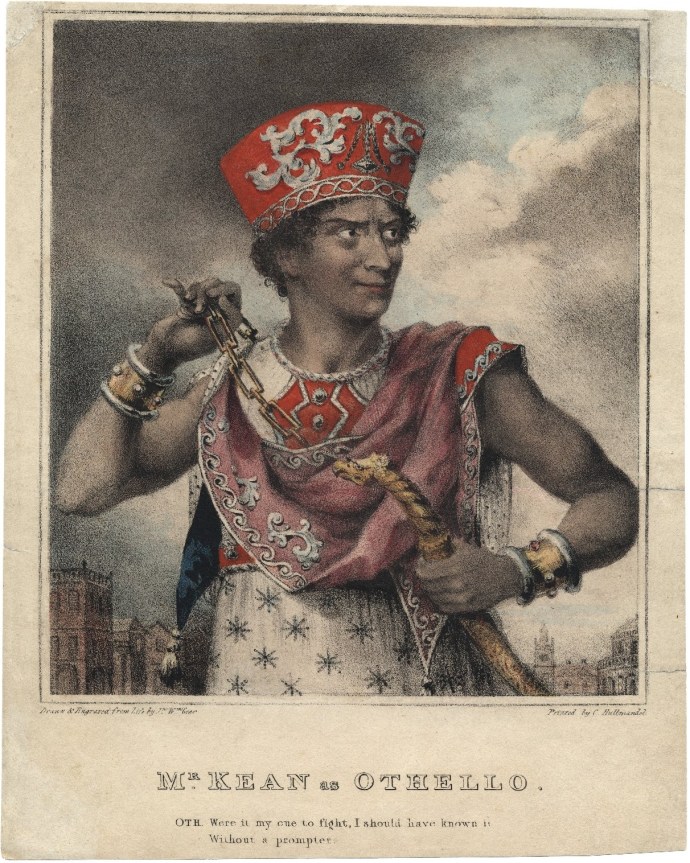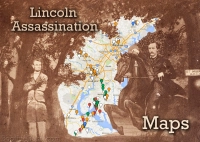I’m in the midst of reading the book, Junius Brutus Booth: Theatrical Prometheus by Stephen M. Archer. One of the most fascinating things I’ve come across thus far is the drama that occurred when Junius Brutus Booth made his star debut in the theaters of London. In preparation for a post about the matter, I found myself with a wealth of material on the early theatrical life of Junius Brutus Booth. Instead of summarizing key points of Junius’ initial acting career, I decided to write a series of posts examining the humble acting beginnings of the man who would later father a theatrical dynasty, including the assassin of President Lincoln. What follows is a continuing part of a series of posts entitled, “When Junius Took the Stage”. Click here for Part 1, here for Part 2, here for Part 3, and here for Part 4 of the series.
Part 5 – When Junius Took on Kean
On February 12th, 1817, Junius Brutus Booth made his staring debut at the Covent Garden Theatre in London. A thunderous round of applause and acclaim followed his efforts and the crowd demanded a repeat of the spectacle the following night. This reprise also proved to be extremely successful for the young actor and also buoyed the spirits of Henry Harris, the manager of Covent Garden who had been convinced to give Booth a shot at stardom. When the audience once again called for a repeat of Booth’s performance the next night, Harris assured the crowd that Booth would return, just not that next night. Harris not only scheduled Booth to play Richard the Third again on Monday the 17th, but also entered into negotiations to sign Booth to a three year contract with his theatre. Junius had exceeded his “try out” as a star at Covent Garden, and Harris was eager to have the rising star remain in his employ.
The press caused by Booth’s appearances at Covent Garden caught the attention not only of the theater-going public, but also the leading star of the London stages, Edmund Kean. Kean was the unrivaled star of London and had been since his staring debut in 1814. Kean had an extremely devoted group of fans and was almost universally adored and acclaimed by the newspapers and theatrical magazines. Kean’s supporters were called “Keanites” but a faction of extremely devoted fans was appropriately known by the name of “The Wolf Club”. In their appreciation and fanaticism for Kean, the Wolves made it a practice to effectively quell any prospective rivals to Kean’s dominance in London. They openly heckled actors who had the audacity to act in roles “perfected” by Kean. Booth’s successful and seemingly ongoing engagement at Covent Garden proved a threat to Kean’s throne. The Wolves responded by describing Booth’s acting as a mere imitator of the great Kean. Perhaps hoping to contain this rival before he had a chance to eclipse him, Edmund Kean, himself, entered the scene.
After Booth’s second staring performance, Kean heard through sources that Booth and Henry Harris had disagreed on an appropriate contract for him to play at Covent Garden. Kean rushed into a carriage and found Booth dining. He greeted Booth as a fellow colleague and informed him that he had a theatrical engagement for him. Kean took Booth over to Drury Lane Theatre, the theatre he acted in and had a great deal of influence. Over drinks and accolades, Kean convinced Junius to sign a contract with Drury Lane. It was inferred that the two would be partners and, together, they would astound London with their mutual talents. For their first shared debut it was decided that they would act in Othello. Kean would play the heroic Venetian general, Othello, while Junius would play the antagonistic ensign bent on his leader’s destruction, Iago. For Junius this likely appeared to be the opportunity of a lifetime. He would act side by side of the great Kean and show all of London that they were equals, skyrocketing his popularity. Perhaps even, the audience would deem him the superior actor, essentially establishing him for life as the premiere actor in London. So much was on the line for this performance in Junius’ eyes. To Kean’s perspective, however, their debut was a chance to put this young upstart down for good. It was an opportunity for Kean to prove his preeminence in the most direct way possible.
In Dr. Archer’s book on Junius Brutus Booth, he entitled the chapter on the Kean-Booth performance as, “Showdown at Old Drury”. This perfectly encompasses the tone that occurred on February 20th, 1817, when the curtain rose on Shakespeare’s Othello.

A newspaper advertisement announcing the shared performance of Booth and Kean for February 20, 1817.
It was a night to be talked about for years to come and the audience came out in droves to see which man earned his laurels. I quote from Dr. Archer:
“Booth lost. Most accounts suggest that Kean acted Booth off the stage, driving him out of London and to America. While not exactly the case, Kean took the palm for the evening, and London theatregoers never again considered Booth a rival to Kean, even after the older actor fell from public favor.”
Kean had brought out all the stops for this much anticipated performance. “On this occasion,” the London Sun reported, “[Kean] exerted himself more than he ever did before. His energy was great, and his execution of many touches very fine. Indeed the whole third Act was a masterpiece in his style.” Kean’s increased vigor and passion was easily observed by the audience and elicited thunders of applause and esteem by his “Wolves”.
Junius’ performance, it was written, “was a creditable performance, but it was nothing like what a too [sanguine] public fondly anticipated it would prove.” The young actor was no match for eminent Kean. In one performance, Kean established his perpetual dominance over Junius Booth. Reviews were consistent that Junius performed well, and that, “with another actor [as Othello] the Iago of the evening might have been thought of great, but by the side of Kean we could discover in him nothing strikingly original in thought, vivid in conception, or brilliant in execution.” It seems clear that the two men were on completely different levels and that Kean’s star shined higher and brighter than Junius’. The cruelest reviews for Junius continued the idea that Booth was merely an imitator of Kean and unworthy to act in his presence.
It is likely that his inability to topple Kean and the practically universal reviews announcing his submission to the reigning star, depressed the young actor. His misfortune was not over yet, however. With a clear victor established, Drury Lane proceeded to cast plays headlining Kean and banishing Booth to less prominent roles. Junius quickly learned that he would not be able to play any roles that “belonged” to Kean. In Richard the Third, the play that had brought him accolades at Covent Garden, he was banished to playing the smaller role to Richmond to Kean’s Richard. He could not play Hamlet, Sir Giles Overreach, or Bertram either. He was to be essentially shelved, allowed in to act in roles barely better than the stock actors, so that he would never dream of rivaling Kean again.
At the same time, Junius was once again approached by Henry Harris at the Covent Garden Theatre. Harris did not consider their negotiations regarding a contract with his theatre to be over and he still desired Junius for his stage. A performance was scheduled at Drury Lane for February 22nd, in which Junius would act as Richmond to Kean’s Richard III. Junius was overwhelmed. As Dr. Archer puts it, “he had acted only slightly more than three years, and he now found himself torn between the two leading theatres of the English-speaking world.” He had signed a contract with Drury Lane to act with Edmund Kean but, on the other hand, fulfilling that contract would subjugate him to less prominent roles and he was receiving an offer from Covent Garden which would allow him to act in his leading roles once again.
A second performance of Othello at the Drury Lane Theatre was scheduled for February 22nd. Audiences, already knowing that Booth was no match for their beloved Kean, came out in droves to express their admiration for the victor. Junius was not anxious for another round of reviews calling him grossly inferior to Kean. He needed time to think and reflect on his future. He wrote a letter to the manager of Drury Lane which was delivered to the theater by 3:30 pm. In it he expressed his inability to perform that night due to being, “extremely ill from the agitation,” he had suffered the previous week. Junius, along with a friend named James Salter, departed London and traveled by coach to a suburb of London called Tottenham. Here, he attempted to restore his body and spirit.
Trouble was brewing back in London, however. Though the manager of the Drury Lane Theatre, Alexander Rae, had received Junius’ letter early enough in the day to have the playbills changed and an announcement of his illness posted, he chose not to. Whether this inaction was prompted by Kean is unknown, but the outcome of this certainly worked in his favor. When the audience members arrived to see Kean and Booth in Othello and were told that Booth was not there, they were furious. The performance went on with stage manager Rae playing the part of Othello to Kean’s Iago.
Due to the crafty behavior of Rae, Kean and the Drury Lane Theatre, Booth’s absence from the performance that night was seen as a slight to London’s theatre going public. In an occupation where one thrived, or died, based on the whims of the audience, this offense would have major ramifications for Junius Brutus Booth. Stay tuned for the next installment in this series, “When Junius Took on the Mob”.
References:
Junius Brutus Booth: Theatrical Prometheus by Stephen Archer









Another great post Dave! Happy New Year!
Thanks, Carolyn! Happy New Year to you as well.
Good blog ppost